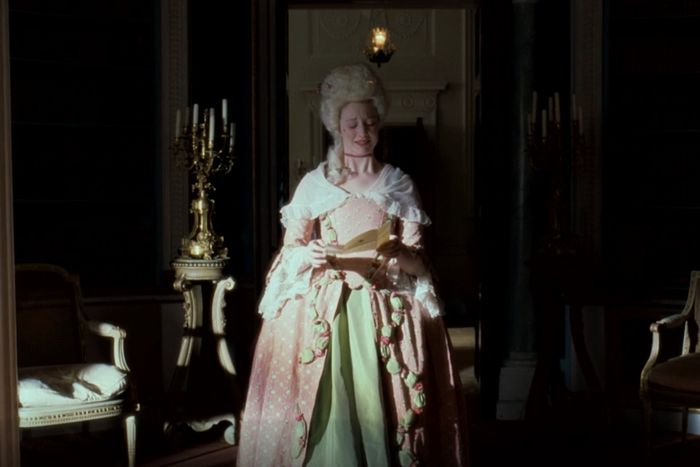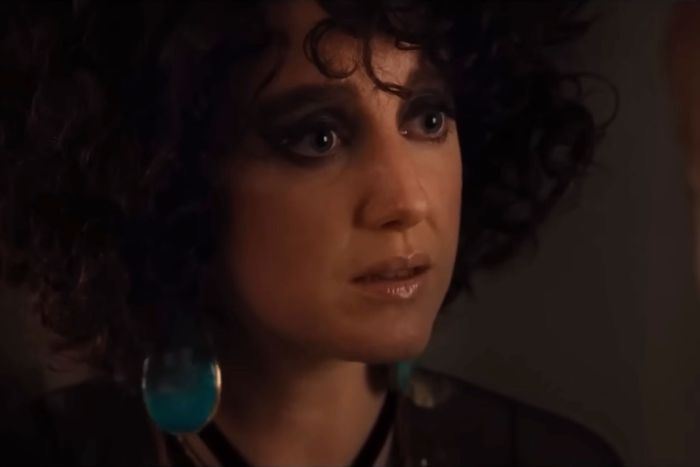
It’s an exercise in understatement to call Andrea Riseborough’s Best Actress nomination (for To Leslie, which approximately 12 people saw before all this Oscar buzz picked up) a surprise. Amid a sea of traditional awards campaigns from much-buzzed favorites like Viola Davis, Margot Robbie, and Danielle Deadwyler, Riseborough quickly rose to prominence in an Oscar campaign best described as guerrilla. Every famous person you’ve ever heard of started singing her praises all at once, forgetting any semblance of subtlety in their haste to spread the To Leslie gospel. (If I ever have to hear the phrase “a small film with a giant heart” again …) Then there were allegations that the campaign violated Academy rules (and part of it technically did), leading to a whole other round of debate and the ultimate upholding of Riseborough’s nomination, albeit with an implicit asterisk next to it.
It’s a shame, really, that all this controversy is, for many, the first they’d heard of Riseborough. The whole affair seems to situate her as a sort of poster child for Establishment Hollywood (not to mention whiteness, as Davis and Deadwyler are seen as the two most likely presumptive nominees that Riseborough bumped out for the nod). However, if you’re familiar with the actress’s filmography, you know that her career trajectory is anything but standard: To Leslie is perhaps the most “conventional” role in her oeuvre, a (deserved!) mainstream breakthrough following nearly two decades of deeply weird character work.
In honor of her remarkably off-kilter filmography, and to better illuminate the singular talent at the heart of all the Academy nonsense, we’ve compiled 11 Andrea Riseborough performances that best encapsulate her daring, consistently surprising approach to the great canon of oddball character actresses past, present, and future.
Venus — Period Film Lover (2006)
As would become par for the course for much of her career, Riseborough makes a lot with very little in her first film role. Here, she’s wonderfully melodramatic as Period Film Lover, an actress in a film-within-the-film expressing lost love in broad, melodramatic strokes — a performance that leaves the film’s leads, Peter O’Toole and Jodie Whitaker, discussing its greatness (and her beauty — talk about a total package!). It’s cliché and not quite true to state that there are no small parts, just small actors, but I’ll be damned if Riseborough doesn’t make a killer case for the tired adage.
Birdman or (The Unexpected Virtue of Ignorance) — Laura Aulburn (2014)
So much of Alejandro González Iñárritu’s Birdman hinges on big, meaty performances from big, storied names, that you’d be forgiven for overlooking Riseborough’s performance as Laura Aulburn, Riggan (Michael Keaton)’s girlfriend and co-star. But to do so is, of course, a massive mistake, as it’s her decisive groundedness that makes the film’s big, ambitious leaps work. Throughout Birdman, Laura repeatedly serves as a seamless gateway between the film’s bleak, Sorkin-adjacent sense of reality and its daring passages of dreamy Surrealism. In less capable hands, Laura could have been a forgettable role — the straight man to balance out, well, pretty much everyone else making some of the most unhinged choices in recent memory. Instead, Riseborough imbues her performance with a zany, Anna Faris–esque affect, resulting in a character just as ethereal as she is down-to-earth. It also doesn’t hurt that she gets to make out with Naomi Watts.
Nocturnal Animals — Alessia Holt (2016)
As is standard for much of Riseborough’s earlier work, her contribution to Tom Ford’s Nocturnal Animals is a delightful moment of bit-part scene stealing. Alessia is an exceedingly minor character, part of the film’s fleeting framing sequence at the movie’s onset. Even so, she manages to be the most memorable part of this sequence, which otherwise only exists to situate Amy Adams’s Susan Morrow in the world of ostentatious high art and to give way to the novel that takes up most of the film. “Having a gay husband isn’t so bad, you know?” is an instant all-timer of a line, and Riseborough’s delivery is wonderfully campy here, nailing in a few short lines the precise sort of flighty ridiculousness this component of the film seeks to satirize. In short, she’s a hag anyone would be lucky to have in their corner.
Battle of the Sexes — Marilyn Barnett (2017)
This criminally underrated gem is rightfully remembered primarily (if it is remembered at all) for the dueling performances of Steve Carell as Bobby Riggs and Emma Stone as Billie Jean King. It is wrongfully remembered, however, as a broad, crowd-pleasing, sports comedy-drama, a reading that misses the film’s markedly tender queer angle entirely. This is, of course, where Riseborough comes in, understanding the ’70s assignment brilliantly with her performance as King’s hairdresser turned lover Marilyn Barnett. It’s a performance characterized most immediately by its softness, a surprising balm compared to some of the more grandiose performances featured elsewhere on this list. Much like in Birdman, Riseborough carries a lot of the emotional weight here, and it’s remarkable just how much she achieves through unfettered sincerity. The result is an affecting turn, one that filters her considerable talent and charisma through a generous helping of approachability.
The Death of Stalin — Svetlana Alliluyeva (2017)
What makes Riseborough’s performance as Joseph Stalin’s precocious daughter work so well is just how out of place it feels in Veep creator Armando Iannucci’s whip-smart political satire. Among a sea of fast-talking figureheads, her Svetlana sticks out like a sore thumb for the sheer stupidity with which she plays the role. She’s borderline unrecognizable here, doing her very best Regency drag as she engages with the film as if it’s an estate drama. It’s a bold choice, one that wouldn’t work unless she was totally, unequivocally committed to the bit, and thankfully (as is par for the course with her, having built a career on determined Choice Making) she never lets even the slightest hint of irony color the performance. In a movie that’s consistently, brilliantly funny, with some truly fantastic ensemble work, she manages the hefty feat of hogging the spotlight every time she’s onscreen. (In that way, she’s nothing if not consistent.)
Black Mirror — Mia Nolan, “Crocodile” (2017)
The year 2017 was a great one for our girl! Here’s a performance you likely saw her in before forgetting about: The cold-blooded mass murderer Mia Nolan in one of the Black Mirror episodes Netflix made. The episode itself is somewhat slight, even by Black Mirror standards, hinging on possibly the series’s weakest technological invention, a clunky device called the Recaller, which reads memories. You wouldn’t know that this is widely considered a lesser effort, however, by Riseborough’s committed performance, which almost single-handedly (flowers are due for John Hillcoat’s stunning, bleak visual direction) carries the episode. In Riseborough’s hands, Mia — who could have so easily become a hysterical caricature — becomes incredibly nuanced, a deliciously ambiguous figure driven (entirely by her own accord) to ruthless and repeated murders. It’s a testament to Riseborough that the result is a character that borders on Shakespearean, full of contradictions yet wholly focused, more than justifying the story’s existence in the Black Mirror canon.
Mandy — Mandy Bloom (2018)
Riseborough’s star began to rise with those smaller turns in the early and mid ’00s, but here’s where she really started to get into the good stuff. Mandy — which paired Riseborough with psychedelic gonzo director Panos Cosmatos (Beyond the Black Rainbow) and the man himself, Nicolas Cage — is an absolute triumph on all fronts for those into its balls-to-the-wall sense of style (which is to say: the coolest among us). Riseborough plays the titular Mandy, a cooler-than-you, otherworldly artist and gas-station cashier. Her presence is equal parts detached and celestial, as she smartly plays Cosmatos’s drugged-out script without even a hint of irony. Mandy is most often discussed as an entry point to Cage’s recent resurgence as an eccentric, feral genre star (and deservedly so; he’s great here), but equally compelling is Riseborough’s heavy lifting in the film’s first half. She’s endlessly captivating, most prominently when she’s saying nothing at all. When she finally does slam on the gas (you’ll know it when you see it), she positively explodes, proving just how much of a force to be reckoned with she is. It’s a sight to behold.
Nancy — Nancy Freeman (2018)
If Mandy exemplifies Riseborough’s penchant for the weird and otherworldly, Nancy (she had a thing for mononyms in 2018!) perhaps best forecasts the sort of work that ultimately got her Oscar attention this year. By all accounts, Nancy Freeman is a total monster: She’s so aimless that she makes it others’ problem, fulfilling her own creative impulses by pretending online to be a grieving mother. When she comes across Jeb (Steve Buscemi) and Ellen (J. Smith-Cameron), a couple who are searching for their long-lost daughter, she homes in on a slight resemblance between herself and an age progression of their daughter, gracelessly upending the couple’s life. She’s a completely unsympathetic character, and Riseborough wisely doesn’t try to redeem her or justify her actions, taking instead the posture of empathy that deftly avoids endorsement. As is a common occurrence for Riseborough, she’s easily the best part of the film, offering an impossibly challenging and lived-in performance that makes this forgotten Sundance gem stand out five years later.
ZeroZeroZero — Emma Lynwood (2020)
Emma Lynwood owns 51 percent of this company, and Andrea Riseborough won’t let you forget it. As the New Orleanian head of a shipping company overseeing a high-profile cocaine shipment, Riseborough presents consistent, fierce, unmitigated power. Her onscreen presence in the show is nothing short of enthralling, a continuous opportunity for her to command any room she’s in with a sort of executive realness that might come off as caricature-esque if she wasn’t so damn convincing when it comes time for Lynwood to be vulnerable. Even as the stakes reach impossibly dizzying heights as the series progresses, it’s Riseborough’s sense of control that anchors it, providing one hell of an emotional through-line. Every time she’s onscreen, it’s clearly a master at work, the type of performance that would be undeniably star-making if the show weren’t so criminally underseen.
Possessor — Tasya Vos (2020)
Much like Mandy, Brandon Cronenberg’s Possessor is an unabashedly strange beast. The high-concept thriller sees Riseborough play Tasya Vos, an assassin who takes control of a host’s body, uses the host to kill the target, and then forces the host to kill themself at the end of a job. If all that sounds dehumanizing, that’s because it is: When we meet Vos, she’s a shell of a person, hardened by years of violent trauma and identity detachment. Riseborough, chameleonic as she is, makes this chronic weariness believable as she performs a sort of uncanny valley of the human experience. We see Tasya incessantly rehearse her interactions with her loved ones, approximating (at best) the love and care she felt at one point. In her embrace of Tasya’s fragility and utterly broken psyche, Riseborough imbues the film, otherwise notable chiefly for its sleek approach to body horror, with an eerie thematic resonance. She’s so firmly removed from humanity as we know it that she achieves a sublimely terrifying menace — with a healthy dose of coolness to make it go down just a bit easier.
Please Baby Please — Suze (2022)
In a perfect world, this is the 2022 Riseborough performance every famous person you’ve ever heard of would have been falling over themselves to praise. It’s a film so exceedingly, unapologetically insane that it makes even the zaniest other members of her filmography (well, maybe not Mandy) appear downright pedestrian. Riseborough is Suze, an unassuming newlywed who — alongside her husband (an excellent Harry Melling) — witnesses a murder at the hands of a greaser gang and then subsequently undergoes a sexual crisis. Her performance is pure camp, extended to its most unhinged end: Everything she does is a massive choice, and she makes it her mission statement to leave no scenery unchewed. It’s a wonderful illumination of just how smart she consistently is throughout her career and how thoughtfully she tends to exercise restraint. If that one scene in Mandy was a peek into the ferocity she exhibits left unattended, her presence in Please Baby Please is an unfettered storm, instantly canonizing her with the likes of John Waters’s crew of Dreamlanders. As Ariana DeBose would have it: Riseborough, Andrea, you’re a genius.



